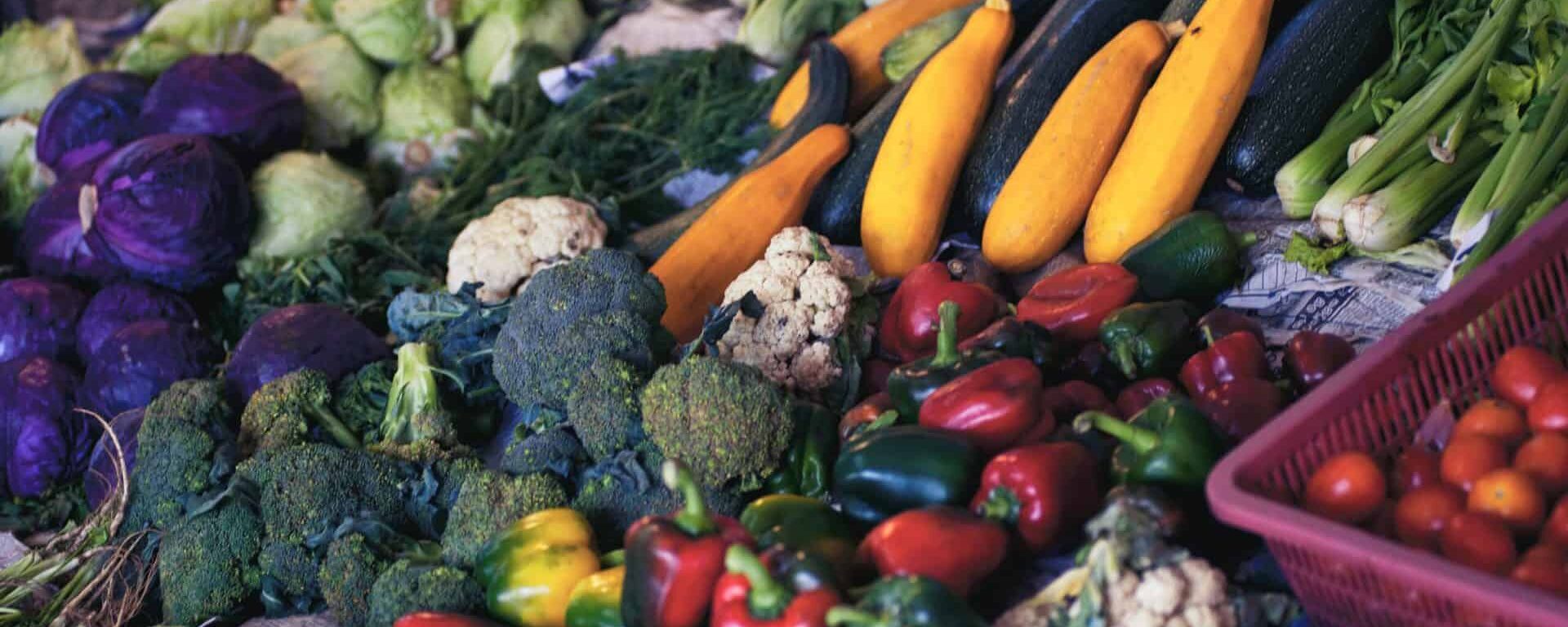
If you’re like me and extremely conscious of making sure your body is receiving optimal nutrients for health, you probably put a lot of thought into the foods that you eat.

You want to be sure you’re getting all of the good stuff to give you energy, support your fitness goals, and maintain a healthy body composition, so you make sure you’re piling on the veggies, avoiding overly-processed empty calories, and getting enough protein with every meal.
But what about the food itself?
Just because you’re filling your plate with better choices (and bravo for that!) doesn’t necessarily mean that you’re eating the healthiest foods available … especially if you aren’t choosing the organic variations.
That’s right! Organic foods are grown without the use of harmful chemicals, questionable GMOs, or hormones – and all of that is good news if you’re trying to be healthy for life and treat your body right.
So why are organic foods better for you? Let’s break down all the different reasons that the source of your food is just as important as the food itself.
Organic Foods Are More Nutritious
Even if you make an effort to eat a balanced and a nutritious diet, you’re still cheating yourself out of nutrients when you choose lower-quality produce.
Several studies have proven that organic foods are simply more nutrient-dense than their non-organic counterparts, especially when it comes to vitamins and minerals like Vitamin C, magnesium, and phosphorus. Organic foods also have more phytochemicals, the natural compounds found in plants that serve up all those antioxidant and health-boosting benefits that are key reasons that we eat veggies in the first place. [*]
So if you’re making an effort to eat your veggies for their health benefits, you might as well go all out and eat the most nutritious veggies available: the organic kind!
You’ll Avoid Dangerous Pesticides and Herbicides
A major reason people choose to eat organic is to minimize their intake of chemicals used in conventional growing processes.
One of the pillars of organic farming is that chemical pesticides or herbicides are avoided for the simple fact that they pose some pretty gruesome health risks. These chemicals might be good for the commercial farmer’s business, because they minimize the damage from pests and weeds, but they’re definitely not substances you want to include in your own diet for health.
Ingesting pesticides is bad news, and unfortunately, if you’re consistently eating non-organic plant foods, you’re likely being exposed to them chronically. And there is evidence to suggest that this can lead to a ton of nasty side-effects like tumor growth, interrupted hormone control, and even birth defects. [*] The same carcinogenic and reproductive risks also apply for herbicides, especially when it comes to glyphosate, the most commonly-used chemical used for fighting off weeds. [*]
Many of these side effects can be attributed to the fact that many of these chemicals are cumulative, meaning they build up in your body over time.
All of these risks lead to a pretty grim reality and good enough reason to avoid conventional crops altogether. The best way to avoid those risks completely is to buy organically-grown crops that aren’t exposed to these nasty chemical sprays.
The Downsides of GMOs
The next worrying issue that stems from not eating organic is that the foods you’re eating aren’t necessarily natural.
Besides chemical sprays, another common practice in agriculture is using genetically modified organisms (GMOs). The most common GMO crops in the U.S. are wheat, soy, corn, cottonseed, and several others are now becoming more mainstream, such as potatoes and papayas. And, if you pay attention to labels, you’ll notice most processed foods contain wheat, corn, and soy in varying combinations.
These plants are genetically modified for certain traits like drought-resistance or pest-resistance. Scientists can do this by taking the DNA from another plant with that wanted trait and inserting it into the desired crop’s DNA.
Again, this is good news for the commercial farm trying to produce as much crop as possible, but just because it’s a common practice doesn’t mean that it’s good for us. These altered plants might mean that you can use less herbicides and pesticides, but they present some health risks of their own.
Some common side-effects that have been found in studies on genetically-modified foods include damage to your liver, kidneys, pancreas, and reproductive organs – not to mention the possible effects that they can have on your blood and immune system! [*]
There are more studies to be done to draw a good conclusion about what this means for our health, but the bottom line here is this: there is enough potential risk that comes with eating GMOs to show that eating organically is less risky.
What About Meat?
So we’ve covered the dangers that come with eating produce that’s not organic, but what about meat and animal products?
You may have already guessed it – organic meats are also better than conventionally-grown meats.
Here’s the deal: animals raised for organic meats don’t use artificial hormones, which is a very common practice for most conventionally produced meat products. Conventional methods for raising animals for meat include using steroidal hormones like estradiol, testosterone, and progesterone, as well as synthetic hormones, to help the animals gain weight and increase the amount of meat that they can produce.
It gets worse when you consider the artificial hormones that are used to increase the production of dairy products like milk. Growth hormones like recombinant bovine growth hormone (rBGH) that can be found in milk might trigger the production of insulin-like growth factor-1 (IGF-1) in you. And unfortunately, exposure to this hormone might increase your risk of certain cancers. [*]
In addition to the hormones involved, animals raised organically have also proven to be more nutritious than conventional meats. Organic meats have a better ratio of omega-3 fatty acids, an important healthy fat that is thought to promote heart health and fight inflammation. This might be because of how they are fed – the animals raised organically are are grass-fed more than their conventional counterparts, which rely more on (GMO) grain-based feeds.
It’s for all of these reasons that I order my meats exclusively from Belcampo. Every step of the process of getting meat to your table is done with care. This includes:
• Allowing animals to openly graze (grass-fed)
• No added hormones or other synthetics
• The use of regenerative farming methods for more nutritious meat and a healthier environment
• Certified humane practices, so animals are happy and healthy
I could honestly go on with a novel of amazing things Belcampo is up to, so check them out below AND use CODE: PRIMAL10 for 10% OFF!

Get 10% OFF Belcampo with CODE: PRIMAL10 here
The Main Takeaway
In short: yes, you should be buying organic food.
Eating organic offers:
• Foods that are more nutritious
• No added chemicals or herbicides
• No genetically modified organisms (GMOs)
• No added hormones
• Eating as nature intended
Science and modern farming techniques might be great for increasing food production, but those processes might come with some concerning potential health issues. If it’s an option for you, buying organic foods might be a better choice. Keep an eye out for “organic” labels if you want to maximize all those health benefits that come with eating right!
Get Access to your Optimal Nutrition Guide in my 12-Week Primal Body Program Here
In the 12-Week Primal Body Program, you’ll get access to a full nutrition AND supplement guide alongside:
• 12 weeks of progressive programming
• Over 60 unique workouts
• Lifetime access to workouts
• Demo video for every exercise
• Detailed how to instructional video for every exercise
• Private Facebook Group
• Access to program on my Primal Fit App